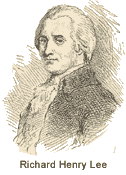Richard Henry Lee was one of the leading lights of the Revolutionary generation and played important roles at almost every stage of America’s drive for independence. He was born at Stratford in Westmoreland County, Virginia and received his education at Wakefield in Yorkshire, England. As a young man at the beginning of the French and Indian War, he raised a militia unit, but — perhaps fortuitously for him — his services were rejected by Edward Braddock.

Lee entered public service as a justice of the peace in Virginia and was elected to the House of Burgesses in 1758. His maiden speech in the legislature called for an end to the slave trade, which marked him then as a member of the radical element in that body. Lee cemented his reputation for challenging the status quo during the Stamp Act crisis in 1765. Working with his brothers Arthur, Francis, and William, all of whom made significant political contributions, Lee gathered support for the Westmoreland Resolves. This was a statement from more than 100 prominent citizens who threatened action against anyone who decided to cooperate with the stamp tax. Lee worked closely with colleagues Thomas Jefferson and Patrick Henry in forming the Virginia committee of correspondence.
Lee was a tall and imposing figure with an aristocratic bearing. He was widely recognized as one of the outstanding orators of his day. He dramatically marked the cadence of his speeches with gestures of a hand wrapped in black silk that had been mangled in a hunting accident.
In 1774, Lee was named a delegate to the First Continental Congress, where he was a leader in the imposition of Nonimportation Agreements against British goods. He also played a pivotal role in the selection of George Washington as commander in chief, skillfully winning support for the Southerner from the prickly New England cousins John Adams and Samuel Adams.
Lee is probably best remembered for his resolution in the Second Continental Congress that, in part, proposed:
That these united Colonies are, and of right ought to be, free and independent States, that they are absolved from all allegiance from the British crown, and that all political connection between America and the State of Great Britain is, and ought to be, totally dissolved....
This resolution was adopted by the Congress and crafted by Jefferson into the Declaration of Independence.
Lee was troubled by ill health, but managed several terms in the Virginia House of Delegates. He returned to Congress in 1784 following the end of the War of Independence. Lee was an outspoken advocate of Anti-Federalist opposition to ratification of the Constitution, fearing that the states were being asked to surrender too much power. He graciously accepted his defeat on that issue and agreed to served as one of Virginia’s first senators (1789-92) under the new government. He used that position to support ratification of the Bill of Rights, the first 10 amendments to the Constitution (text), and worked with special dedication for the adoption of Amendment X.